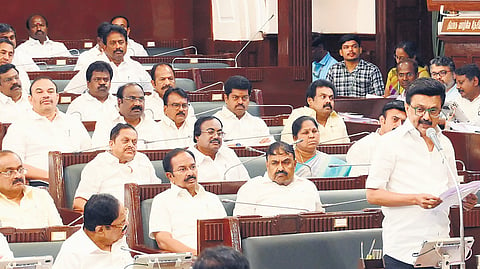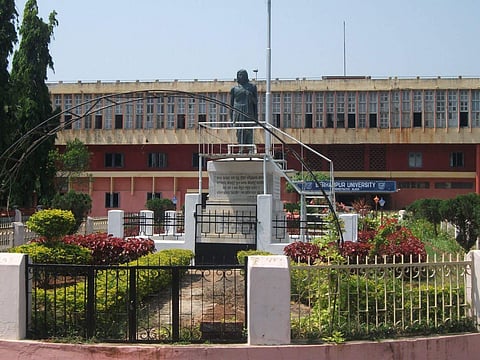Power of Postgraduation: Stronger skills, greater edge in research and employability
A PG degree opens various avenues for students to explore
TIMES NEWS NETWORK 19.01.2026 TIMES EDUCATION
Although students today are graduating with stronger practical exposure, they assess if opting for a master’s degree is a pathway to deeper expertise and enhanced professional credibility.
Retaining Appeal
Postgraduate engineering degrees continue to hold value at institutes offering strong specialisation and industry-oriented training. However, enrolment at MTech courses varies across institutions. UG degrees provide breadth, while MTech allows students to develop depth in a specific area. MTech courses fall into two categories: coursework-based degrees and researchoriented courses, sometimes offered as MS degrees. Coursework-based graduates typically take up specialised engineering roles such as machine learning engineers, data engineers. Those from research-based programmes often move into research engineer roles or pursue doctoral studies. Most students pursue MTech for better technical roles and higher pay, while a smaller proportion has a clear research orientation. Working professionals who are dissatisfied with their current roles also view MTech as a pathway to reskill.
Dinesh Babu Jayagopi, HoD, Data Science and AI, IIIT-Bangalore
Skills over Degrees
MCom programme has seen a noticeable shift in employer expectations in recent years. This shift is no longer centred primarily on academic grades or formal qualifications, but increasingly on the skill sets and applied competencies that students bring to the workplace. At the UG level, there has been an enhancement in curriculum design, experiential learning, and skill integration. As a result, students today often graduate with stronger practical exposure and employabilityoriented skills. In the current employment landscape, UG students have access to a range of marketdriven avenues. There appears to be limited differentiation in placement outcomes or salary packages between UG and PG degree holders. While marginal differences may exist, they are not substantial as employers are prioritising demonstrable skills, adaptability, and workplace readiness over academic qualification.
Anson K J, assistant registrar, CHRIST (Deemed to be University), Bangalore
Institutional Failures
PG education is steadily losing its attractiveness due to systemic academic and institutional failures. A major deterrent is PG CUET, which rewards rote memorisation rather than conceptual understanding. This problem is compounded by the NEP-UGCF structure, which has weakened disciplinary depth by crowding UG curricula with low-rigour VACs and SECs, leaving students disengaged from their core subjects. The decline of public varsities has further accelerated student disinterest. Poor-quality course design weakened teaching standards, and political interference has eroded academic autonomy. Independent thinking is sidelined in favour of academically shallow projects. Also, a mistaken belief persists that PG degrees offer limited job prospects with many students abandoning PG pathways or choosing overseas education .
Rudrashish Chakraborty, associate prof, Eng Dept, KMC, DU
Career Alignment
An LLM holds value when it offers strong specialisation and clear career alignment. Law graduates are increasingly pursuing LLM programmes to deepen their expertise in specific areas, rather than treating the degree as a general qualification. Specialisations such as Corporate Law, Intellectual Property Rights, International Law, and Human Rights Law enhance employability by aligning graduates with specific practice areas in law firms, and global organisations. An LLM is mandatory for those aspiring to enter academia and provides tangible benefits to professionals working in the prosecution or judiciary, including eligibility for additional increments. With the introduction of mandatory practice requirements before appearing for lower judiciary exams, LLM has become a preferred choice for aspirants who wish to strengthen their legal foundation without losing extra time, as the duration of the programme is counted towards judicial eligibility.
Vageshwari Deswal, professor, Faculty of Law, DU Application-oriented Roles
In India, design education was first introduced at the PG level, and later expanded to the UG level. One of the key reasons students opt for a master’s in design is the industry’s perception about qualifications. Recruiters often prefer candidates who bring interdisciplinary exposure; they are considered more industry-ready and mature in applying technology or engineering knowledge to realworld problems. A master’s degree in design allows engineers to move from technical roles to application-oriented positions. Pursuing a master’s provide formal entry into designcentric roles and access to corporate design studios, industrial design firms, and technology companies. It also helps Fine Arts graduates in securing positions in global firms. While research aspirations exist, pursuing a master’s adds professional value.
Sugandh Malhotra, professor, IDC School of Design, IIT Bombay
Gateway to Govt Jobs
With PG degrees, students are better armed to pursue further studies such as PhD. Moreover, a master’s is required for all govt jobs and for writing the NET/JRF exams, which are essential for taking up academics. With diplomas in journalism, a student can only get into the industry and pursue journalism, but for higher studies, govt jobs, and getting into academics, a degree is required. For research too, a PG degree is needed for appearing in the PhD admission entrance exam or for taking JRF. Considering PG degree courses include a key component of internship with media organisations, it gives students practical experience of working in the industry. A PG degree opens more opportunities, not to mention better pay packages and promotions. Pragya Paliwal Gaur, vice-chancellor, IIMC
.jpg)
















